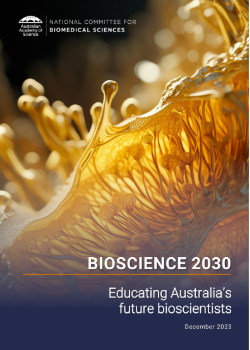In December 2023, the National Committee for Biomedical Sciences at the Australian Academy of Science published the report Bioscience 2030: Educating Australia’s Future Bioscientists. This groundbreaking effort aims to shape the future of bioscience higher education in Australia. Offering insights drawn from the results of a survey of the bioscience community about the current state of bioscience education in Australia, the report outlines six practical recommendations to ensure graduates are well equipped to face the challenges and opportunities of the future.

Bioscience education in Australia is on a promising foundation, with institutions equipping graduates with essential skills, but a significant gap has been identified. Critical thinking, data analysis, and the ability to deal with uncertainty stand out as areas that need urgent attention. These skills are vital for navigating the emerging challenges and opportunities presented by advancements and are highly transferable across various disciplines. The report provides an initial exploration of the implications of artificial intelligence (AI) for the future of bioscience education. AI poses both opportunities and challenges for higher education bioscience programs, impacting various aspects of teaching and learning.
The report highlights the following key challenges:
Addressing these challenges requires a shift in educational practices, a strategic focus on increasing connectivity between industry and educational institutions, and the integration of active learning pedagogies.
The necessity for this report stemmed from a clear vision: to prepare a diverse cohort of bioscientists capable of addressing complex global issues, from climate change to pandemics, through interdisciplinary capabilities and effective communication. The findings underscore the importance of a practical, hands-on approach to science education, advocating for a hybrid model that combines the best of in-person and online learning, a lesson learned from the COVID-19 pandemic.
The report concludes with a call to action for higher education bioscience teaching to:
It envisions strengthening the ties between various disciplines to prepare students for real-world challenges, thereby maintaining Australia’s excellence in bioscience.
This report presents a clear path for enriching bioscience higher education in Australia. It serves as a roadmap, guiding stakeholders to collaborate in fostering an educational environment that is both innovative and inclusive, ensuring that Australia remains at the forefront of bioscience education and research.
© 2025 Australian Academy of Science